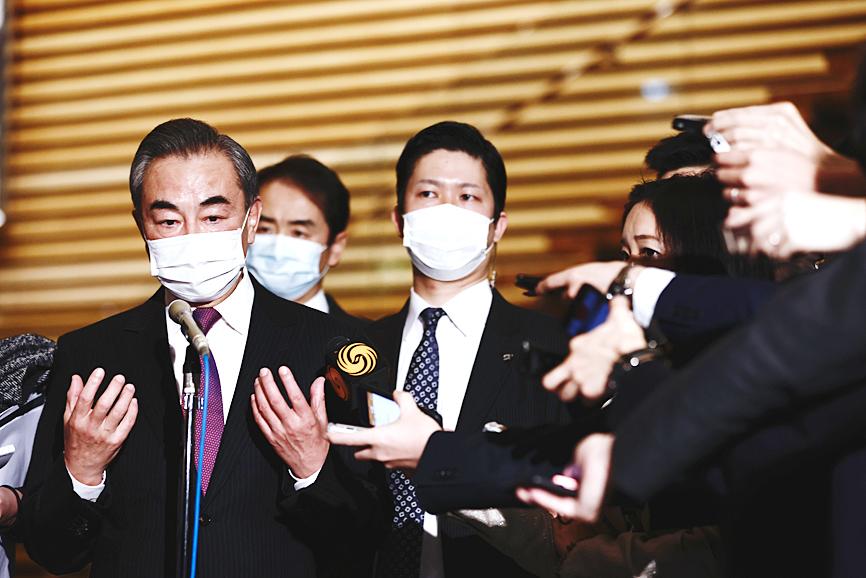Japan yesterday used a visit by Chinese Minister of Foreign Affairs Wang Yi (王毅) to protest Beijing’s increased activity and what it calls infiltration around disputed islands that Taiwan also claims, while Japanese Prime Minister Yoshihide Suga said that a stable relationship with China was important.
“The situation is extremely serious,” Japanese Chief Cabinet Secretary Katsunobu Kato told reporters after meeting with Wang, who arrived in Tokyo on Tuesday for a two-day visit.
Relations between the two countries have been strained over territorial disputes and World War II history, even though ties have improved in the past few years while China’s trade dispute with the US has escalated.

Photo: Bloomberg
The territorial row is centered on the Japanese-controlled Diaoyutais (釣魚台), which Japan calls Senkaku and China calls Diaoyu.
Chinese coast guard ships have stepped up activity around the islands, despite protests and warnings by the Japanese authorities.
Kato said that the Japanese government earlier yesterday protested when Chinese ships entered Japan’s contiguous zone, just outside of its territorial waters, for the 306th time this year.
“I conveyed [to Wang] our concerns about the activities of the Chinese government ships around the islands and asked for positive steps by China,” Kato said.
He said Wang hoped that China would form a positive relationship with Japan and that the two sides would play constructive roles in the region.
On Tuesday, Japanese Minister of Foreign Affairs Toshimitsu Motegi and Wang agreed to try not to escalate tensions around the islands.
The two foreign ministers also agreed to resume business travel between the world’s second and third-largest economies through a “business track” program that would allow visitors to engage in limited activities during their 14-day quarantine periods.
They also agreed to work together on climate change, energy conservation, healthcare and digital commerce.
Later yesterday, Suga said that the relationship was important.
“A stable relationship between the two countries is important not only for Japan and China, but also for the region and the international community,” Suga said.
Wang told Suga that Chinese President Xi Jinping (習近平) wants to build a good working relationship.
Additional reporting by Reuters

MORE VISITORS: The Tourism Administration said that it is seeing positive prospects in its efforts to expand the tourism market in North America and Europe Taiwan has been ranked as the cheapest place in the world to travel to this year, based on a list recommended by NerdWallet. The San Francisco-based personal finance company said that Taiwan topped the list of 16 nations it chose for budget travelers because US tourists do not need visas and travelers can easily have a good meal for less than US$10. A bus ride in Taipei costs just under US$0.50, while subway rides start at US$0.60, the firm said, adding that public transportation in Taiwan is easy to navigate. The firm also called Taiwan a “food lover’s paradise,” citing inexpensive breakfast stalls

US PUBLICATION: The results indicated a change in attitude after a 2023 survey showed 55 percent supported full-scale war to achieve unification, the report said More than half of Chinese were against the use of force to unify with Taiwan under any circumstances, a survey conducted by the Atlanta, Georgia-based Carter Center and Emory University found. The survey results, which were released on Wednesday in a report titled “Sovereignty, Security, & US-China Relations: Chinese Public Opinion,” showed that 55.1 percent of respondents agreed or somewhat agreed that “the Taiwan problem should not be resolved using force under any circumstances,” while 24.5 percent “strongly” or “somewhat” disagreed with the statement. The results indicated a change in attitude after a survey published in “Assessing Public Support for (Non)Peaceful Unification

PLUGGING HOLES: The amendments would bring the legislation in line with systems found in other countries such as Japan and the US, Legislator Chen Kuan-ting said Democratic Progressive Party (DPP) Legislator Chen Kuan-ting (陳冠廷) has proposed amending national security legislation amid a spate of espionage cases. Potential gaps in security vetting procedures for personnel with access to sensitive information prompted him to propose the amendments, which would introduce changes to Article 14 of the Classified National Security Information Protection Act (國家機密保護法), Chen said yesterday. The proposal, which aims to enhance interagency vetting procedures and reduce the risk of classified information leaks, would establish a comprehensive security clearance system in Taiwan, he said. The amendment would require character and loyalty checks for civil servants and intelligence personnel prior to

The China Coast Guard has seized control of a disputed reef near a major Philippine military outpost in the South China Sea, Beijing’s state media said, adding to longstanding territorial tensions with Manila. Beijing claims sovereignty over almost all of the South China Sea and has waved away competing assertions from other countries as well as an international ruling that its position has no legal basis. China and the Philippines have engaged in months of confrontations in the contested waters, and Manila is taking part in sweeping joint military drills with the US which Beijing has slammed as destabilizing. The Chinese coast guard